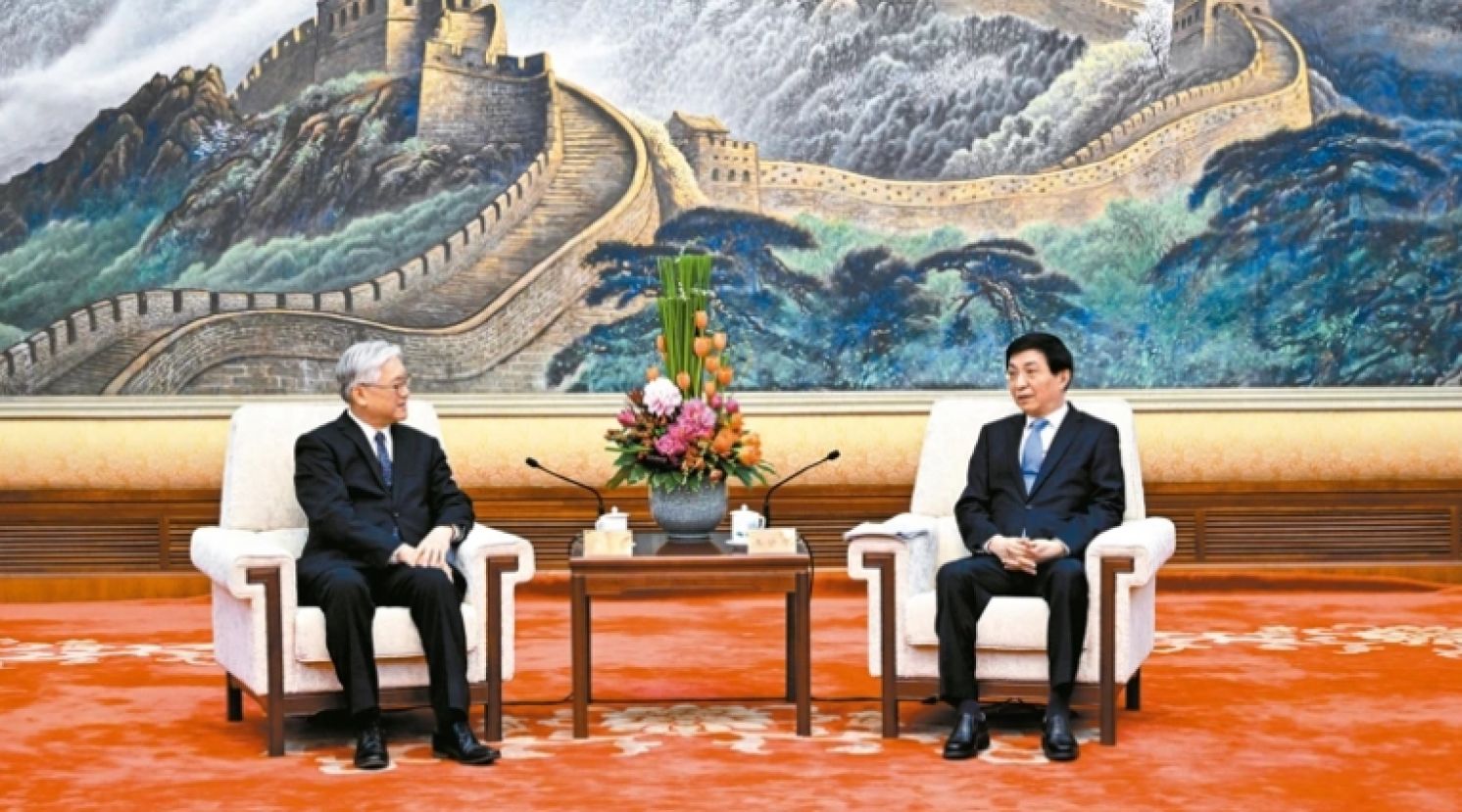
KMT Vice Chairman Visits Mainland China and Meets with Senior Officials
News Report by Taiwan Weekly
Vice Chairman Andrew Hsia of the opposition Kuomintang (KMT) led a party delegation to visit mainland China on February 8. While in Beijing the delegation met with the Chinese Communist Party Politburo Standing Committee member Wang Huning, the new Director Song Tao of the Taiwan Affairs Office of the State Council, and Communist Party Secretary of Beijing Yin Li.
Wang received Hsia’s delegation at the Great Hall of the People on February 10. Wang told the delegation that “Taiwan independence” is incompatible with peace like fire and water and is against the well-being of the Taiwan compatriots. Wang stated: “No one cares more about the Taiwan compatriots’ aspiration for peace, free from worry and good lives. The people on both sides of the Taiwan Strait desire normal exchange and communication, so we should resume cross-strait exchange as early as possible.”
Wang Huning became the fourth-ranking member of the Politburo Standing Committee after the 20th National Congress of the Communist Party. He is expected to assume chairmanship of the Chinese People's Political Consultative Conference, overseeing the united front and Taiwan, Hong Kong and Macao affairs.
Vice Chairman Hsia’s delegation was the first group of Taiwan visitors that Wang has received since the 20th National Congress. By receiving Hsia, Wang demonstrated that he has officially taken over the Taiwan affairs and joined the Central Leading Group for Taiwan Affairs of the Central Committee of the Communist Party.
United Daily News quoted a source in reporting that mainland China’s high-profile reception of Hsia shows the Beijing authorities attach great importance to cross-strait relations. It also reflects that Beijing hopes to seize the initiative on the Taiwan affairs when facing the changing U.S.-China relations. In the future, mainland China is likely to be more flexible when dealing with Taiwan in which “the soft approach would become softer and the hard would become harder.”
According to Xinhua News Agency, Wang mentioned that the mainland will fully implement the spirit of the 20th National Congress and the overall guiding principles of the Communist Party in the new era in solving the Taiwan question by carrying out Xi Jinping’s instruction to promote cross-strait peaceful development, exchange and cooperation and to unite the Taiwan compatriots in achieving the unification of the motherland and the great rejuvenation of the Chinese nation.
The KMT stated that Vice Chairman Andrew Hsia first affirmed the achievement of the cross-strait exchange and cooperation from the meeting between Lien Chan and Hu Jintao in 2005 to that between Ma Ying-jeou and Xi in 2015. Hsia then raised the vision and direction for future exchange and cooperation and exchanged views with Wang. Hsia also expressed KMT’s position and views on the current cross-strait problems and the Taiwan people’s concern over economic, trade and livelihood issues.
Hsia stated that 18 years ago when tensions intensified in the Taiwan Strait, the KMT’s ice-breaking visit resolved the crisis that put both sides on the verge of war. From an empirical perspective, no matter how tumultuous the relations or how divergent the opinions, as long as both sides sustain exchange and dialogue, accumulate mutual confidence, resolve conflict with wisdom, exercise tolerance to seek consensus, and set a goal to maintain peace across the Taiwan Strait, there is definitely no difficulty that we cannot overcome together.
Taiwan’s Mainland Affairs Council (MAC) responded to the Hsia-Wang Meeting by criticizing the Beijing authorities’ political, military and economic coercion is against the Taiwan people’s well-being and harmful to regional peace. According to the MAC, cross-strait exchange and interaction should be based on reason, equality and mutual respect. Efforts should be made to seek pragmatic communication and mutual understanding to resolve differences. The MAC urged Beijing authorities to face the problem with communication without preconditions and to give up coercive actions towards Taiwan. It is the true and responsible way to maintain peace in the Taiwan Strait and to promote the well-being of the people on both sides.
According to Chao Chun-Shan, professor emeritus at Tamkang University who joined Hsia in visiting mainland China, Song told the KMT delegation that he welcomes the people from the green camp to visit the mainland as long as they recognize the “1992 Consensus” and oppose “Taiwan independence.” Chao indicated that it is the first time the mainland has made that statement and is a goodwill gesture towards Taiwan. When Hsia conveyed to the mainland side the problems Taiwan encountered in exporting agricultural and fishery products to China, Wang repeatedly instructed Song to carry out Taiwan farmers’ and fishermen’s suggestions.
Chao stated it’s not just Wang and Song who demonstrated a whole new style and active approach, but also the mainland scholars stopped using words in a threatening tone such as “unification by force” during discussions. Instead, they urged the resumption of cross-strait exchange and dialogue. Chao felt a sense of “warm spring”, yet whether it will become “flowers blossom” or “fruit bearing” remains to be seen. It would require Taiwan’s response and joint efforts from both sides.
On Song’s invitation to the Democratic Progressive Party (DPP), the MAC responded bysaying that cross-strait exchange should be based on reason, equality and mutual respect. By setting political preconditions or artificial barriers, it cannot promote real cross-strait mutual understanding. It will only become “a selective model of exchange pushing for unification, one that is unable to reach the mainstream opinion of Taiwan, and shows it is merely a united front tactic aiming to divide Taiwan.”
DPP legislators stated that the KMT’s cooperation with mainland China in external propaganda is to help China sing its own praises and blame everything on the DPP administration. The KMT owes the people of Taiwan an outright explanation. DPP legislators also mentioned mainland China has long been using “bull trap” tactics to deal with Taiwan’s agricultural sector and the KMT should avoid being used by the Chinese Communists.